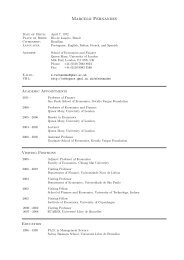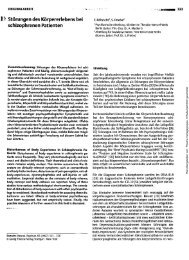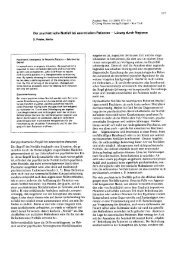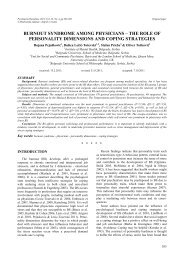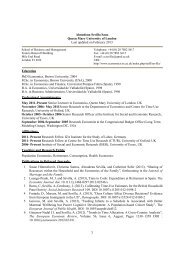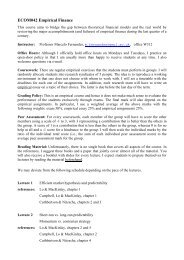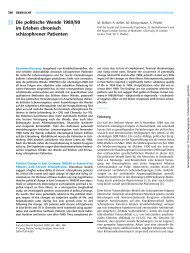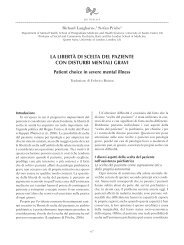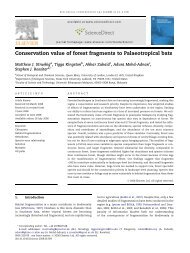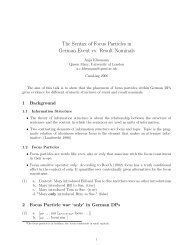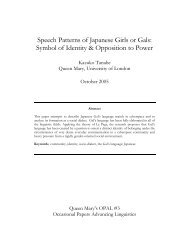Proofs - Personal Webspace for QMUL - Queen Mary, University of ...
Proofs - Personal Webspace for QMUL - Queen Mary, University of ...
Proofs - Personal Webspace for QMUL - Queen Mary, University of ...
Create successful ePaper yourself
Turn your PDF publications into a flip-book with our unique Google optimized e-Paper software.
patients (<strong>of</strong>ten with lower social status) communicate with<br />
pr<strong>of</strong>essionals (<strong>of</strong>ten stemming from the middle class) a potential<br />
barrier may lie in the different meaning that immigrants and<br />
pr<strong>of</strong>essionals connect to certain terms or expressions. Thus<br />
we would like to address the question if people from different<br />
cultural and social backgrounds use different words and concepts<br />
when asked about mental health problems. A further question<br />
is if religious terms fi gure prominently in the group <strong>of</strong> Turkish<br />
immigrants as it is suggested in the literature that connects illness<br />
concepts <strong>of</strong> Turkish immigrants to traditional world views.<br />
This paper examines terms concerning mental health problems<br />
that were named in a Free Listing process <strong>of</strong> three groups.<br />
The biggest minority group in Germany, Turkish immigrants, is<br />
compared to native Germans and to a group in the country <strong>of</strong><br />
origin <strong>of</strong> the immigrants, Turks in Istanbul. By comparing these<br />
three groups, possible differences not only between the native<br />
and immigrant populations but also between Turkish persons in<br />
Germany and Turkey can be asserted. Thereby differences in the<br />
subjective meaning <strong>of</strong> terms can be investigated which in turn<br />
might be the source <strong>of</strong> communication pitfalls. Secondly, this<br />
comparison along cultural lines is transcended by deepening the<br />
analysis and evaluating the results according to the parameter<br />
<strong>of</strong> educational background <strong>of</strong> interviewees. In this way, the<br />
assertion <strong>of</strong> mere “cultural” differences is put into perspective<br />
and the complexity <strong>of</strong> the data is emphasized.<br />
2. Method<br />
The research project “Mental health and migration” <strong>of</strong> the<br />
Department <strong>of</strong> Psychiatry and Psychotherapy <strong>of</strong> the Charity<br />
<strong>University</strong> Medicine in Berlin is approaching the mental health<br />
status <strong>of</strong> immigrants and the utilization <strong>of</strong> health care services<br />
from different angles. An epidemiological survey on prevalence<br />
<strong>of</strong> mental health problems among the biggest minority group<br />
in Germany, Turkish immigrants, is conducted to yield missing<br />
data on the mental health status <strong>of</strong> that immigrant group.<br />
Complementary, the status <strong>of</strong> Intercultural Opening <strong>of</strong> German<br />
community mental health care institutions in Berlin is assessed,<br />
thus focusing on how institutions address immigrants’ needs<br />
(see Penka et al. in this volume) and a cross- cultural competence<br />
training is developed, implemented and evaluated. Furthermore<br />
barriers to the mental health care system and resources in handling<br />
mental disorders <strong>of</strong> Turkish immigrants are assessed by<br />
using the methods Free Listing and Pile Sort [4,19].<br />
In the paper at hand the results <strong>of</strong> this Free Listing process<br />
will be discussed. They allow insights into differences in vocabulary<br />
concerning mental health problems, which are indications<br />
<strong>for</strong> possible differences in health beliefs and may impair the<br />
communication between patients and pr<strong>of</strong>essionals in the health<br />
care system. Furthermore the homogeneity <strong>of</strong> ideas about mental<br />
health problems inside the investigated groups is analysed.<br />
In the Free Listing process relevant items <strong>of</strong> the fi eld <strong>of</strong> mental<br />
health problems were collected through interviews, structured<br />
by short interview guidelines. In this way in<strong>for</strong>mation about the<br />
“spectrum <strong>of</strong> words” connected to the concept <strong>of</strong> mental health<br />
issues could be gathered and relevant items be identifi ed. For<br />
the Free Listing the study group “Mental health and migration”<br />
interviewed 220 persons aged between 18 and 65. 70 persons<br />
A. Vardar et al. / European Psychiatry 27 (2012) / supplement n°2 / S50-S55 S51<br />
were native Germans in Berlin, 66 were Turkish immigrants2 living<br />
in Berlin and 79 were Turks in Istanbul. In each group users and<br />
non- users <strong>of</strong> the mental health care system were interviewed and<br />
additionally pr<strong>of</strong>essionals in Berlin and in Istanbul were included<br />
in the sample. Users were defi ned as currently using or having<br />
used in- or outpatient mental health care services in their lives<br />
be<strong>for</strong>e, while non- users were defi ned as persons who haven’t<br />
been treated in in- or outpatient mental health care institutions.<br />
Borgatti [4] suggests interviewing a minimum <strong>of</strong> 20 persons per<br />
group to gather the relevant items. As the groups in this study<br />
were quite heterogeneous and specifi c inner differences such as<br />
educational background, gender and age were to be addressed,<br />
the number <strong>of</strong> interviewees was raised. The Free Listing process<br />
was stopped when a saturation <strong>of</strong> answers could be observed. For<br />
choosing the participants, the theoretical sampling method [12]<br />
was used to equally include both genders and diverse academic<br />
backgrounds and ages, and thereby collecting data from different<br />
sub- groups in order to prevent bias.<br />
During Free Listing the interviewees were asked four questions<br />
about the defi nition, the meaning, the causes and possible<br />
cures concerning mental health issues: 1. What is a psychological<br />
problem/mental disorder in your opinion? 2. What does it mean to<br />
have psychological problems or mental disorders? 3. What could<br />
be causes <strong>of</strong> psychological problems or mental disorders? 4. If a<br />
friend <strong>of</strong> yours had psychological problems or mental disorders,<br />
what would you advice him to do and who could help? The interviewees<br />
were asked to answer these questions by listing items<br />
that came to their mind fi rst and they could list as many items as<br />
they wanted. The Free Listing questions were deliberately asked<br />
in an open way, such that no own cultural categories <strong>of</strong> the study<br />
group were conveyed to the participants and that the latter could<br />
name items that were truly relevant to them. All participants<br />
could choose if they wanted to answer the questions in written<br />
<strong>for</strong>m or orally and in the latter case answers were noted by the<br />
interviewers. Allowing <strong>for</strong> oral answers was meant to ensure that<br />
possible non- literate persons or those <strong>for</strong> whom writing down<br />
the answers would represent a barrier <strong>for</strong> participation could be<br />
included in the study. Additionally, the interviewees could choose<br />
if they wanted to be interviewed in German or Turkish, as the<br />
interviewers could speak both languages fl uently.<br />
The users were recruited in psychiatric outpatient clinics in<br />
Berlin and Istanbul and in a counselling centre <strong>for</strong> chronic mental<br />
ill people in Berlin. Non- users were contacted through several<br />
social institutions and, starting with the fi rst few participants,<br />
through linkage sampling [22].<br />
After conducting the interviews, the items were counted.<br />
Altogether around 2700 different items were mentioned in the Free<br />
Listing. These items were coded into categories, because in many<br />
cases different terms with almost the same meaning had been<br />
used and thus items had to be abstracted. In an iterative process<br />
the codes were approved several times under multi- disciplinary<br />
perspectives to prevent possible bias <strong>of</strong> a single researcher. After<br />
fi nishing the coding process 750 categories remained in total.<br />
<strong>Pro<strong>of</strong>s</strong><br />
2 In the study “mental health and migration” the group <strong>of</strong> Turkish immigrants<br />
are defi ned according to the Mikrozensus in Germany as persons who have<br />
immigrated themselves to Germany from Turkey after 1947 or whose<br />
parents have immigrated. For the study the criterion <strong>of</strong> mother tongue as<br />
Turkish was also used.



